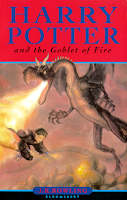 |
| (Amazon UK link) |
But JK Rowling is worth a re-read, it seems. Even after finishing the first three books in the past week, I wasn't at all bored by reading the fourth. Indeed, despite its length (over 600 page) I completed it in two days. Reading it with hindsight was helpful too: there were no clever surprises, as there were on the first reading. Instead I could see where clues were dropped, and how cleverly the plot hangs together.
The ending is still dark. Very dark. It involves a relatively minor character being killed and some extremely unpleasant graveyard scenes. This book is not recommended for sensitive younger children, and I'm not sure if I'll want to see the movie when it comes out since it could be quite disturbing visually.
But this time through, reading straight after the earlier books, I could see the series as a whole and this episode as vital in the development of the overall plot. Indeed I began to wonder if there's a Christian 'end times' thread to the Harry Potter books. They begin with the distinction between those who have a gift, and those who don't: those who can see clearly, and those who are effectively blind to anything beyond the material world. And in a time of relative peace, won by unconditional love and sacrifice, people are still worried under the surface that the Dark Lord might surface and cause chaos and distress.
Gradually, as the books progress, this worry becomes reality and Harry is caught up in the middle of it. The books aren't directly allegorical as such. Dumbledore isn't exactly a God-figure although he's a totally trustworthy sage. The dementors are pretty close to demons. The patronuses are a bit like guardian angels. But looking at the series as a whole, the overall theme is of good vs evil. Forget the 'magical' trappings; look instead at the traits that the good side possesses: courage, loyalty, honesty, integrity, forgiveness, humour, the ability to distinguish laws from rules, an eagerness for personal growth.
And this book? On re-reading, it's risen from my least favourite to one of the best, in my estimation. Harry and friends are beginning to grow up. There are a few hints about hormones and girl-boy relationships, though far less than would be expected from typical books about 14-year-olds. But it makes it possibly more suitable to an older audience than the earlier books, which were recommended for age 9-11. I would put this more in the 12-15 category myself, but of course it's read and enjoyed by people of all ages, from seven to well over seventy.
Highly recommended. But read the earlier books first. They are:
- Harry Potter and the Philosopher's Stone
- Harry Potter and the Chamber of Secrets
- Harry Potter and the Prisoner of Azkaban
(You can also see my review of the film Harry Potter and the Goblet of Fire, which I eventually saw on DVD in 2012)
No comments:
Post a Comment